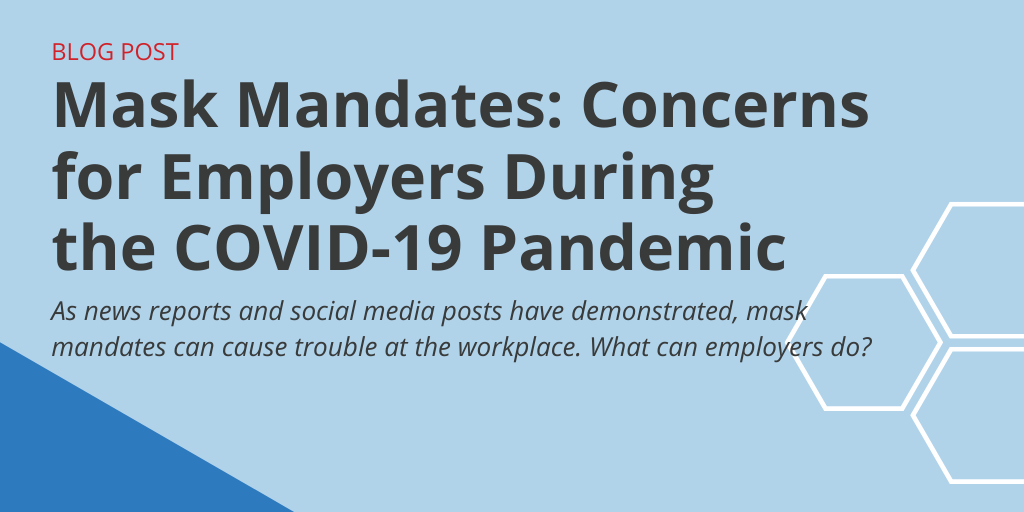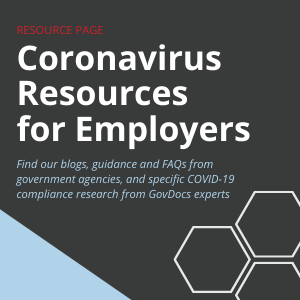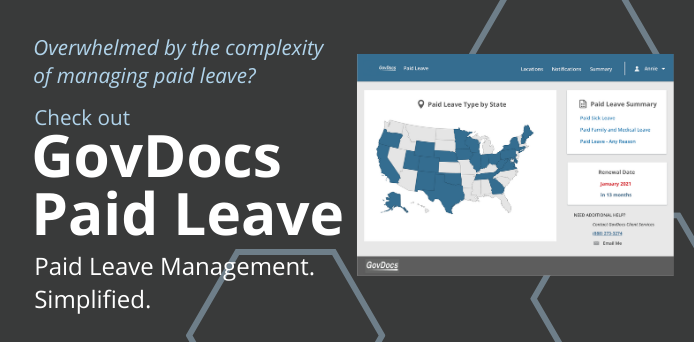EMPLOYMENT LAW NEWS
Mask Mandates: Concerns for Employers During the COVID-19 Pandemic
By Kris Janisch
Published Aug. 6, 2020

As news reports and social media posts have demonstrated, mask mandates can cause trouble at the workplace. What can employers do?
As states and large companies have begin mandating masks, it has opened the door to numerous issues for employers.
The problems come in many forms:
- Aggressive customers who don’t want to wear masks
- Employees who refuse to wear masks for personal or religious reasons
- Determining what types of masks are appropriate
- Assessing potential high-risk employees
- Americans with Disabilities Act (ADA) concerns
Many of the nation’s largest retailers have instituted mask-wearing policies. Likewise, most states have mandated mask-wearing as part of the effort to curb the spread of COVID-19. The growth of mask mandates has added another layer to the requirements employers face to help keep employees and customers safe as the nation continues to reopen during the coronavirus pandemic.
Related: OSHA Issues Workplace Guidance on Wearing Masks
What About Angry Customers?
As news reports and social media posts have demonstrated, mask mandates can cause trouble at the workplace.
What can employers do to combat these situations and head off potentially dangerous positions for employees?
Many businesses post clear signage about the policy, hand out free masks and take steps to limit interaction between customers and employees.
In some instances, lawmakers have stepped in to try to protect employees from unruly customers. Illinois this spring considered a bill that would make violence against retail workers who are enforcing COVID-19 guidelines a felony rather than a misdemeanor.
Elsewhere, in Michigan, the governor did not criminalize refusals to wear masks, even though they’re mandated, and businesses can refuse entry to people not wearing them.
Often, of course, mask-wearing customers will shame those not wearing them.
Still, as enforcement of these mandates often fall to frontline workers, employers should consider outlining a plan in case of a dangerous situation or even posting security at entrances, as some companies have done.
Can Employers Legally Require Masks?
 For employees, companies are able to require their workers wear masks.
For employees, companies are able to require their workers wear masks.
“That’s absolutely legitimate,” said Kevin Mosher, an employment law attorney, during a recent GovDocs webinar about economies reopening.
A mask would be considered safety equipment, and employees who refuse to wear one are insubordinate.
“If you’re not going to wear a mask, I don’t have a job for you,” said Mosher, partner at Thompson Coe and founder of myHRgenius.
However, many customers make the argument that mask mandates aren’t the law and believe they can refuse to wear them.
Generally, the question of whether forcing customers to wear is legal is yes. So long as such policies are applied evenly, they are legal.
As Robert Mascari, chief assistant district attorney in Madison County, told a local news outlet in New York State:
“All businesses have the right to refuse service so long as it is not violating one of those protected classes,” he said. “You can’t refuse to serve me because I’m half Italian and half Irish. You can refuse to serve me if I’m being an idiot.”
Still, there are instances where mask enforcement may be problematic, which brings us to our final point.
ADA Concerns with Mask Requirements
With both employees and customers, there could be ADA considerations for employers to monitor regarding facemasks.
Should an employee have a legitimate medical issue that prevents the individual from wearing a mask, employers should talk to the worker and determine if other accommodations can be made.
But it’s not so easy with customers who claim medical hardship.
If a guest exhibits clear symptoms of the coronavirus, refusal of service would be more justifiable. Otherwise, employers would have to demonstrate the person with the disability presents a “direct threat” to the safety of others that cannot be mitigated through modified procedures.
Should a customer with a ADA concern refuse to wear a mask, businesses could work to accommodate the person through contactless service, using dry erase boards to communicate, helping with online shopping or curbside pickup.
Conclusion
The term “new normal” may seem trite. But the coronavirus has made certain aspects of everyday life a major concern for employers.
Whether you have to calculate square footage, determine the guidelines for your location in a particular state or any other of the number of requirements, it’s a lot to manage.
This Employment Law News blog is intended for market awareness only, it is not to be used for legal advice or counsel.
Keep Informed
with GovDocs Labor Law News

What is GovDocs?
GovDocs simplifies employment law compliance for large, multi-jurisdiction employers in the U.S. and Canada. The GovDocs software platform integrates three solutions in one convenient place to help you master the employment laws impacting your business. Whether you manage a postings, minimum wage or paid leave program, our products cut through research time, provide proactive insights into the everchanging landscape of employment laws and reduce the risk of noncompliance. The company is headquartered in St. Paul, Minn.
Have fewer than 30 locations?
The GovDocs Poster Store simplifies posting compliance for employers with less than 30 locations across all industries, offering a variety of posting products to meet your labor law compliance needs.



